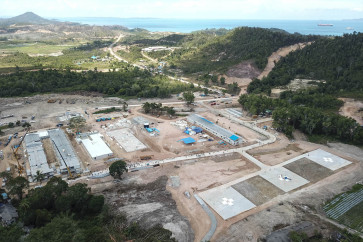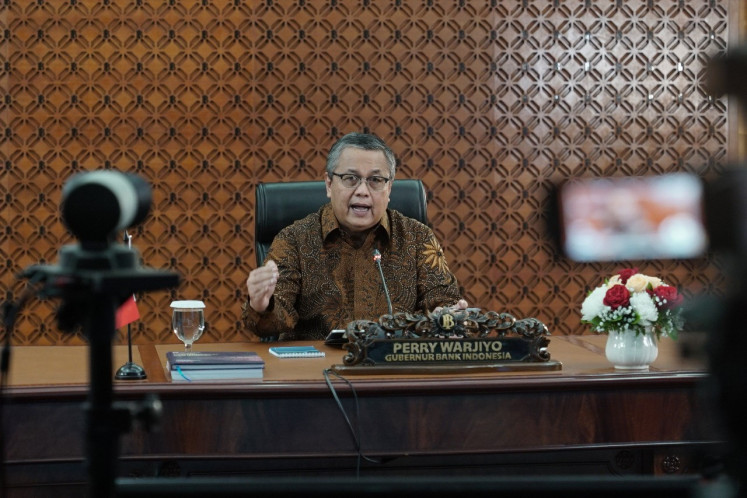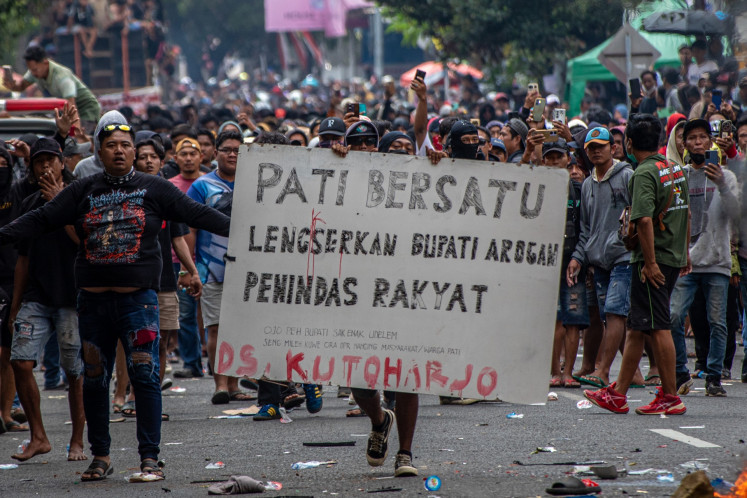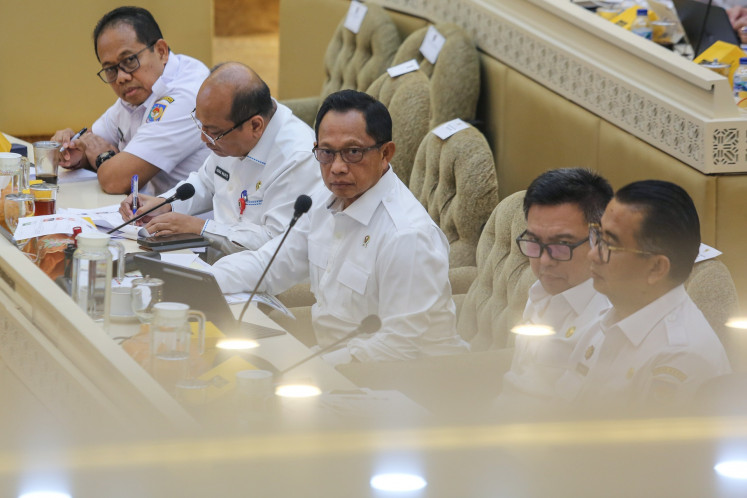Popular Reads
Top Results
Can't find what you're looking for?
View all search resultsPopular Reads
Top Results
Can't find what you're looking for?
View all search resultsHow new antiterrorism law will change Indonesia's war on terror
The new terrorism law will include numerous provisions on terrorism prevention measures -- something that is not dealt with comprehensively in the prevailing terror law, Enny said.
Change text size
Gift Premium Articles
to Anyone
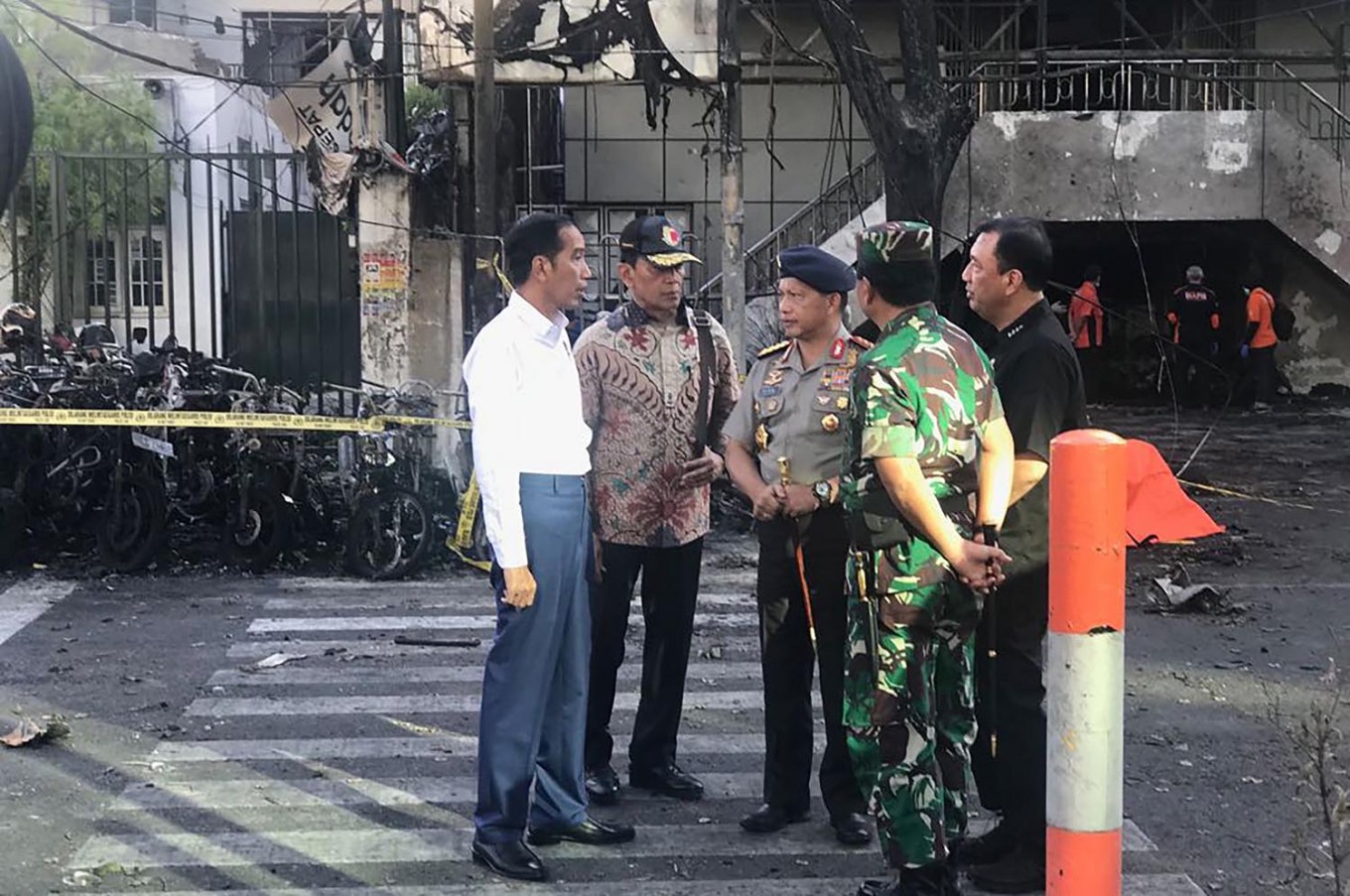 This handout photo released by Presidential Palace on May 13, 2018 shows Indonesia's President Joko Widodo (L), National Police Chief Tito Karnavian (C), Coordinating Minister for Social, Political, Legal and Security Affairs Wiranto (2nd L), and Armed Forces Chief Hadi Tjahjanto (2nd R) at the scene of an attack outside the Central Pantekosta church (Gereja Pantekosta Pusat) in Surabaya.
A series of blasts, including at least one suicide bombing, struck churches in Indonesia on Sunday, killing at least 11 people and wounding dozens in the deadliest attack for years in the world's biggest Muslim-majority country. (AFP/Presidential Palace)
This handout photo released by Presidential Palace on May 13, 2018 shows Indonesia's President Joko Widodo (L), National Police Chief Tito Karnavian (C), Coordinating Minister for Social, Political, Legal and Security Affairs Wiranto (2nd L), and Armed Forces Chief Hadi Tjahjanto (2nd R) at the scene of an attack outside the Central Pantekosta church (Gereja Pantekosta Pusat) in Surabaya.
A series of blasts, including at least one suicide bombing, struck churches in Indonesia on Sunday, killing at least 11 people and wounding dozens in the deadliest attack for years in the world's biggest Muslim-majority country. (AFP/Presidential Palace)
I
ndonesia will soon have a new antiterrorism law to replace the current law, which is widely seen as weak, with deliberations on the antiterrorism bill expected to conclude this May or June.
Speaking to The Jakarta Post in an interview on Thursday, Enny Nurbaningsih, head of President Joko “Jokowi” Widodo administration's team to deliberate the antiterrorism bill, ensured the new legislation could provide security for Indonesians against deadly terror attacks such as those that had occurred recently in numerous places across Indonesia's most populated island of Java.
Calls for the government and the House of Representatives to conclude the long-due deliberation on the bill have mounted after the attacks, which were allegedly conducted by an Islamic State (IS)-linked local jihadist organization known as Jamaah Ansharud Daulah (JAD).
Enny, who is also head of the Law and Human Rights Ministry's National Law Development Agency (BPHN), said the government expected deliberations to be concluded at a hearing with the parliament scheduled for May 23, saying that nearly "99 percent" of the bill’s content had been finalized, and only the debate over the definition of terrorism as a crime remained to be concluded.
Below are some crucial points in the antiterrorism bill, which was initiated after the Jan. 14, 2016 bombings on Jl. MH Thamrin, one of Jakarta's busiest thoroughfares.
What is terrorism?
One of the main reasons the deliberations have been dragging on for months is that the government and the House have failed to reach an agreement on what constitutes terrorism.
While the government insists that terrorism is "any deed that uses violence or threats of violence on a massive scale, and/or causes damage to strategic vital objects, the environment, public facilities or international facilities", the House demands that terrorism as a crime includes "any deed that is based on political and ideological motives and/or threats to state security."
Lawmakers have said a detailed and rigid definition of terrorism as a crime would ensure that investigators crack down on terrorist activities, while the government believes it would only hamper terrorism prevention and mitigation processes, as it would obligate investigators to determine whether suspects had either political or ideological motives before naming them as terrorists.
Enny said the government would accommodate the parliament's request by inserting the latter's version in the general explanation part of the bill, not in the verse section of it.
The government expects to convey that proposal to the parliament at the scheduled May 23 hearing, so that the bill can be further deliberated before being proposed for the next plenary meeting.
Terrorism prevention measures
Law enforcers will have greater powers. The new terrorism law will include numerous provisions on terrorism prevention measures -- something that is not dealt with comprehensively in the prevailing terror law, Enny said.
"For instance, we can do nothing to people who plan terror attacks if we use the prevailing law," said Enny. Under the bill, plotting terror attacks is a crime.
The bill stipulates that a person accused of terrorism could be held in custody from seven to 14 days without charges. Law enforcers could hold them for up to 200 days after officially charging them with terrorism.
Rights activists have voiced concerns over the policy, but Enny ensured that the policy would be carried out in accordance with human rights principles.
If there is a law enforcement officer found guilty of violating human rights principles during the terrorism investigation process, they will be charged with a criminal offense, said Enny.
People who import explosives or components such as chemical, biological, radiological, nuclear or radioactive weapons for terrorism purposes into the country, or make, receive or possess them, can be charged under Article 10a of the bill, which carries a maximum sentence of 20 years’ imprisonment.
The bill also charges people who mastermind terror attacks, partake in paramilitary training with the purpose of launching terror attacks or join overseas wars related to terror attacks, with maximum terms ranging from 12 years, 15 years, 20 years to life sentence and the death penalty.
That means the police will later be able to charge Indonesians returning from war-torn countries where they are proven to have joined a terrorist group such as IS.
Terrorism prevention measures also include what the bill describes as "counter-radicalization" and "deradicalization" activities.
Counter-radicalization activities are intended for people or groups that have been exposed to radical teachings that could potentially lead them to committing terror attacks. Deradicalization activities are intended for terrorist suspects, defendants, convicts, inmates or former inmates and aim to reintegrate these people into society.
The bill says counter-radicalization and deradicalization activities will be detailed in other supporting regulations.
The roles of the Indonesian Military (TNI)
The decades-long rivalry between the two institutions to handle and manage state security has been apparent during the deliberation of the terrorism bill. Activists have also warned about possible abuse of power carried out by the two authorities in handling terrorism.
Enny ensured that, while the bill finally included a provision on the role of the TNI in countering terrorism, the military would not be involved in law enforcement.
“To prevent the military from entering the domain of law enforcement, we have decided that the President will regulate the TNI’s involvement through a government regulation.”
The regulation will refer to the 2004 TNI Law, which stipulates that the TNI’s involvement in civilian affairs depends on the political decision of the state, which should be consulted with the House.
Compensation and protection for victims
Victims of terror attacks have long sought comprehensive provisions about their rights as victims.
Yayasan Penyintas Indonesia, an organization that supports terror victims, detailed in 2016 that over 1,900 victims of terror attacks suffered from physical and mental trauma from a number of bomb attacks that had occurred since the start of the millennium.
House terrorism bill committee chairman Muhammad Syafi'i said last year that "the well-being of victims has been one of our biggest concerns since the beginning of the deliberation."
The terrorism bill has one special chapter dedicated to detailing protection for victims of terror attacks. The bill acknowledges two kinds of victims: direct victims, for example victims who are killed or injured in attacks, and indirect victims, for example wives who lose their husbands as a result of a terror attack.
The bill says terror victims are the "responsibility of the state", a responsibility which is fulfilled by providing medical assistance, psychosocial and psychological rehabilitation, as well as financial compensation for the families of the deceased. (ahw)

